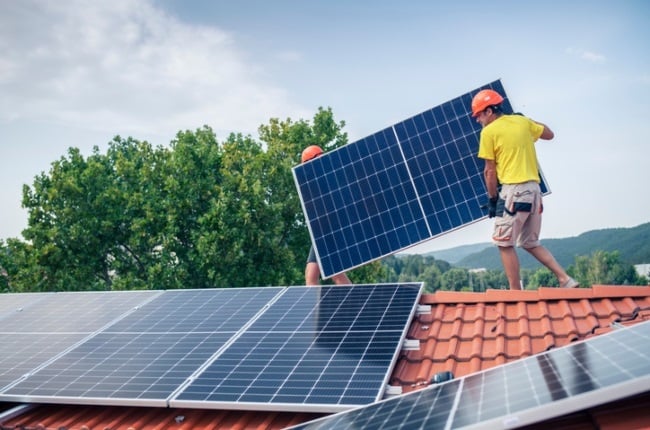
- The solar tax incentive for individuals will only be in place for another 10 days.
- Qualifying individuals will be able to claim the tax credit from SARS when their annual tax is calculated later this year.
- SARS issued a guidance note on the incentive, indicating who qualifies and how to claim.
- For more financial news, go to the News24 Business front page.
With time running out on the solar tax incentive for individuals, the South African Revenue Service (SARS) has issued a guidance note explaining who qualifies for the credit and how to redeem it.
The solar tax incentive for individuals was first announced by Finance Minister Enoch Godongwana at the tabling of the National Budget in 2023.
Under the incentive, qualifying individuals will be able to reduce their tax burden by 25% of the value they spent on the panels, up to a maximum of R15 000.
The deadline to have purchased, installed, and brought into use new and unused solar PV panels - and still qualify for the solar tax incentive - is 29 February. Panels brought into use from March onwards will no longer qualify for the tax credit.
Qualifying individuals will be able to claim the tax credit from SARS when their annual tax is calculated later this year.
READ MORE | All you need to know about how the solar PV tax incentives will work
A stronger incentive, offering a 125% tax credit, was also put in place for businesses. This incentive was put in place for two years, meaning it is set to expire at the end of February 2025.
Whether Godongwana will announce an extension to the solar tax incentive for individuals in his 2024 budget speech on Wednesday remains to be seen.
Solar boom
The introduction of the incentives coincided with huge growth in the installed capacity of solar not belonging to Eskom in South Africa.
There has been a 66% increase in the installed capacity of so-called "rooftop" solar in South Africa, based on Eskom data, between March 2023, when the incentive was introduced, and January 2024.
While coal and solar power are very different in nature, technically, the installed capacity of solar PV not contracted to Eskom outstrips the largest coal power station in the country.
READ MORE | The incredible boom in rooftop solar - which now outstrips SA's biggest power plant
While the rapid growth in the installed capacity of solar occurred while the solar incentive was in place, the incentive was not the primary driver of solar adoption.
Chris Yelland, managing director of EE Business Intelligence, formerly told News24 that maintaining power during load shedding and saving on electricity bills were likely stronger drivers of solar adoption than the incentives.
In either case, eligible individuals will be able to claim the credit when submitting their tax returns.
Here is a breakdown of the eligibility criteria for the individual incentive and the information that you will need to submit in the tax return.
The information below is based of the SARS guidance note which can be accessed here for a more detailed breakdown.
Eligibility
The guidance note put requirements in place to ensure that only panels that contribute new energy to the grid qualify as part of the incentive.
This is one of the reasons that only spend on solar PV panels and not other parts of the installation - such as inverters and batteries - qualifies for the incentive.
"The rationale behind allowing a deduction on the cost of only the solar PV panel is owing to the fact that it is the solar PV panels which promote or expand electricity generation capacity in the country," reads the SARS guidance note.
Here are the eligibility requirements:
- Only panels with a generation capacity greater than 275 watts (W) will be eligible for the incentive. Most home solar panels have an output rating between 350W and 450W, according to Energy Sage.
- The panels must have been brought into use for the first time between 1 March 2023 and 1 March 2024.
- The installed panels must be new. New in this context means that the panels were "recently acquired" and installed. SARS didn’t say exactly what "recently acquired" meant, but indicated that the panels would not be new if they were acquired "years before" and installed during the incentive period.
- The panels must be unused. This means the panels only qualify if they were not previously in use in another installation.
- The panels must be mounted or affixed to a residence primarily used for domestic purposes.
- The installation must be connected to the distribution board of the residence.
- An electrical certificate of compliance must have been issued for the installation.
The tax credit is only claimable by the individual who incurred the cost of the solar PV panels. This creates some potentially interesting scenarios.
For instance, if solar PV panels were paid by a tenant on a leased property, the tenant will be able to apply for the solar tax credit, not the owner of the property. If this is the case, then the person who purchased the installation must submit a rental contract indicating the names of the parties to the lease agreement in addition to the other documentation that is required.
In addition to this, if the cost of the panels was split between multiple people, for instance, co-owners of a property, then the individuals will be able to claim 25% of the amount that they themselves paid for the panels, to a maximum value of R15 000.
Information required
The tax credit will be claimed when the individual's normal tax payable is determined during the tax season. This means that applicants will have to wait for the tax season to open before claiming the credit.
According to the guidance note, here is the information that individuals may have to submit in their tax return:
- The number of new and unused solar PV panels installed.
- Confirmation that the panels are connected to the residence’s electrical distribution board.
- Confirmation that the minimum generation capacity is 275W for each solar PV panel.
- Confirmation that a legitimate electrical certificate of compliance has been issued.
The guidance note does not rule out the possibility that more information will be required in the application.
Also, the guidance note stated that individuals will have to retain copies of documentation such as the electrical certificate of compliance issued for their installation, an invoice for the purchased panels, proof of the date of installation and when the panels were brought into use, and proof that the panels are installed at a domestic residence that is used by the person who bought the panels.




 Publications
Publications
 Partners
Partners












